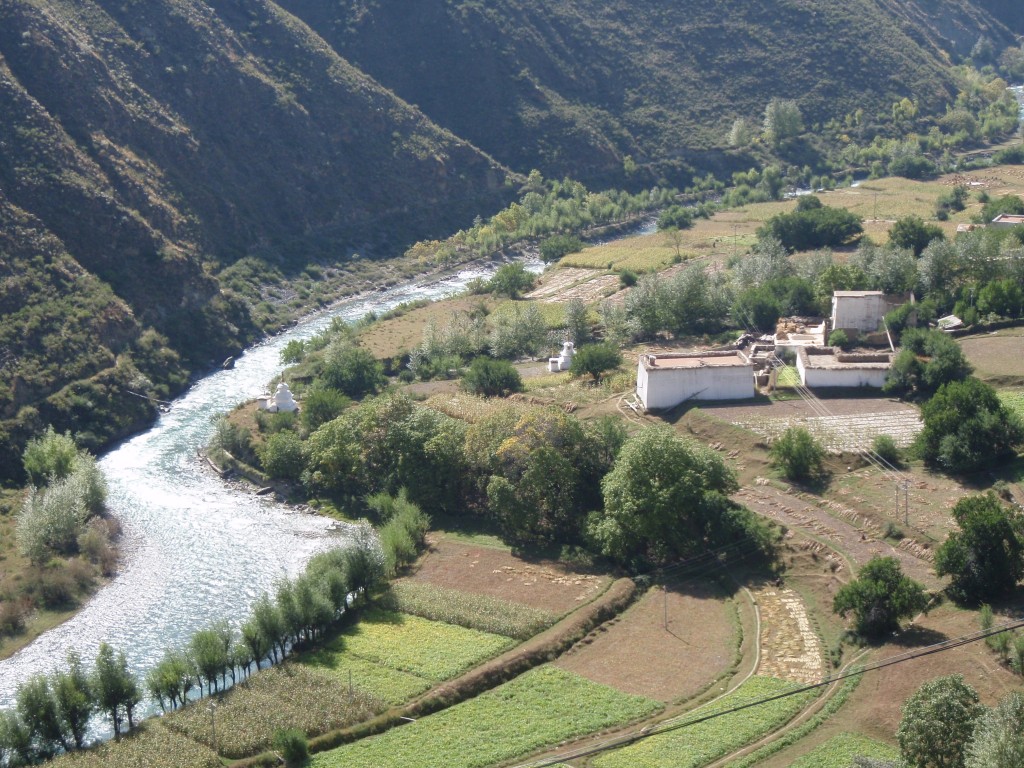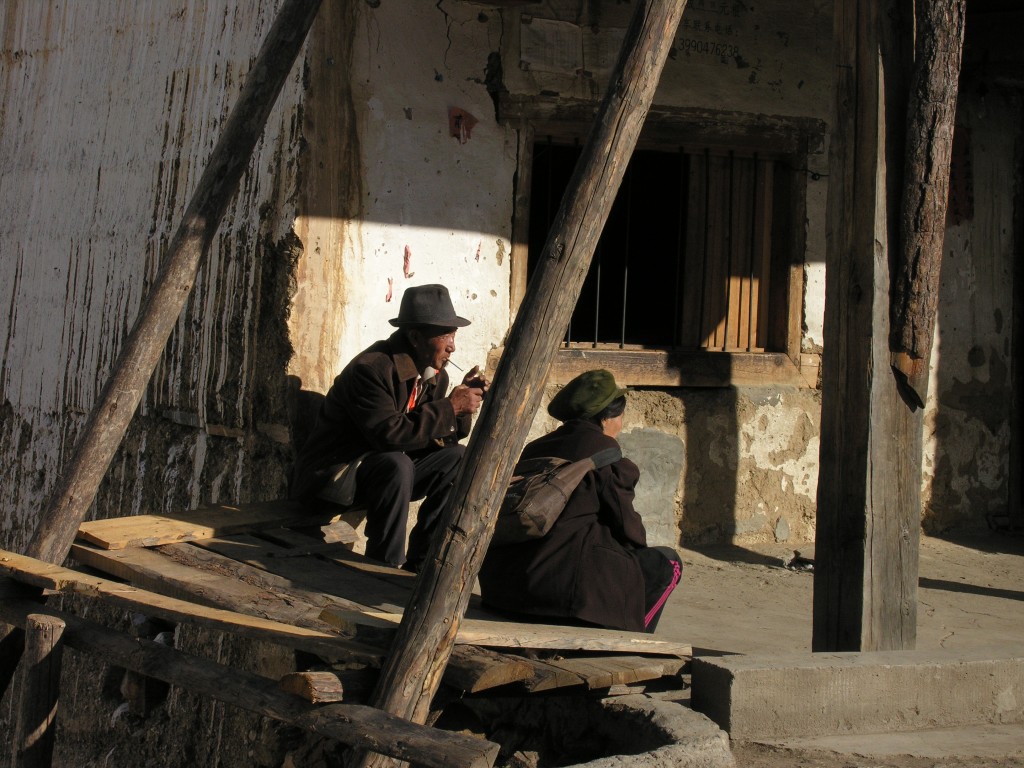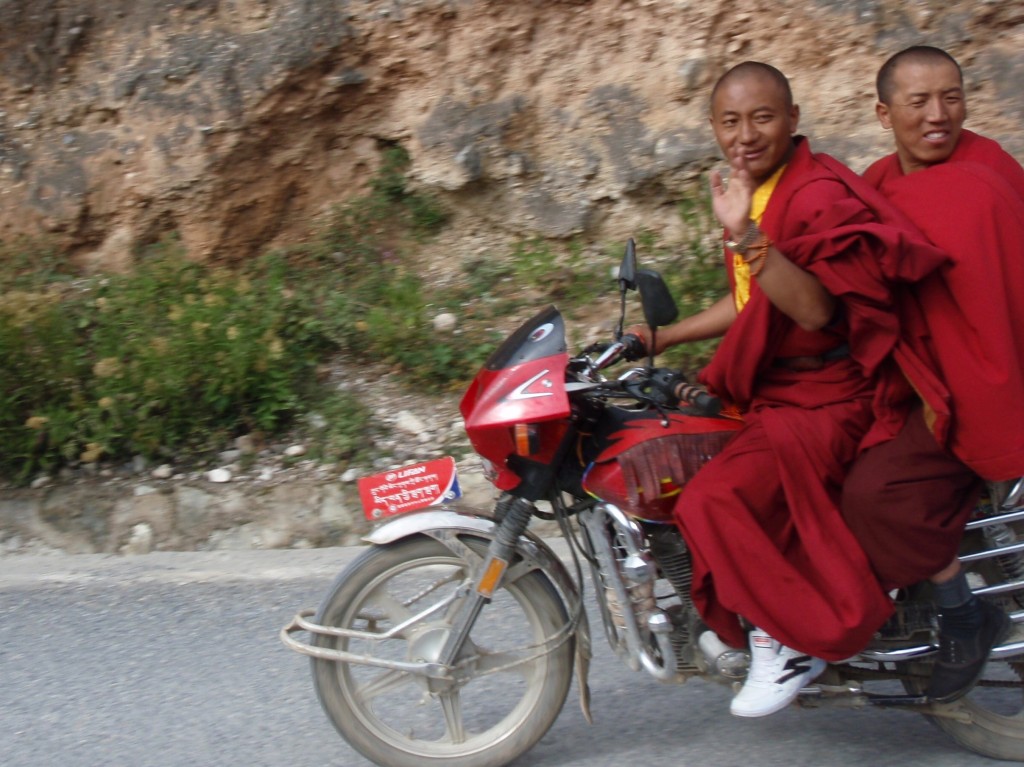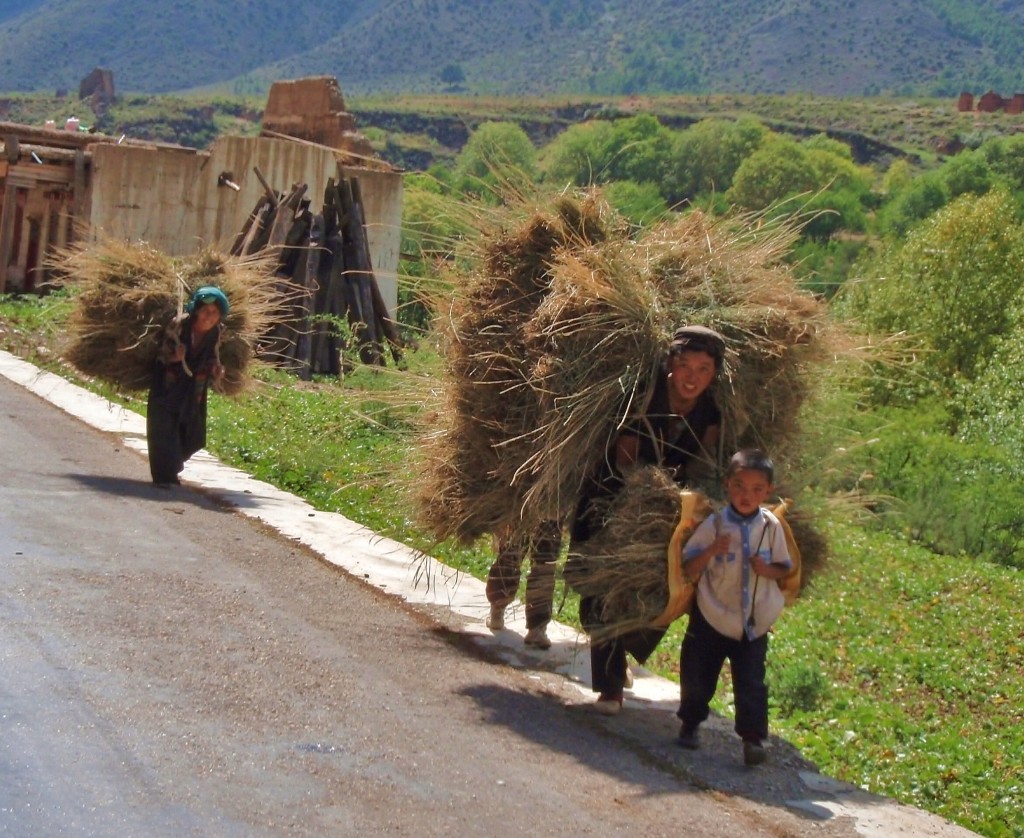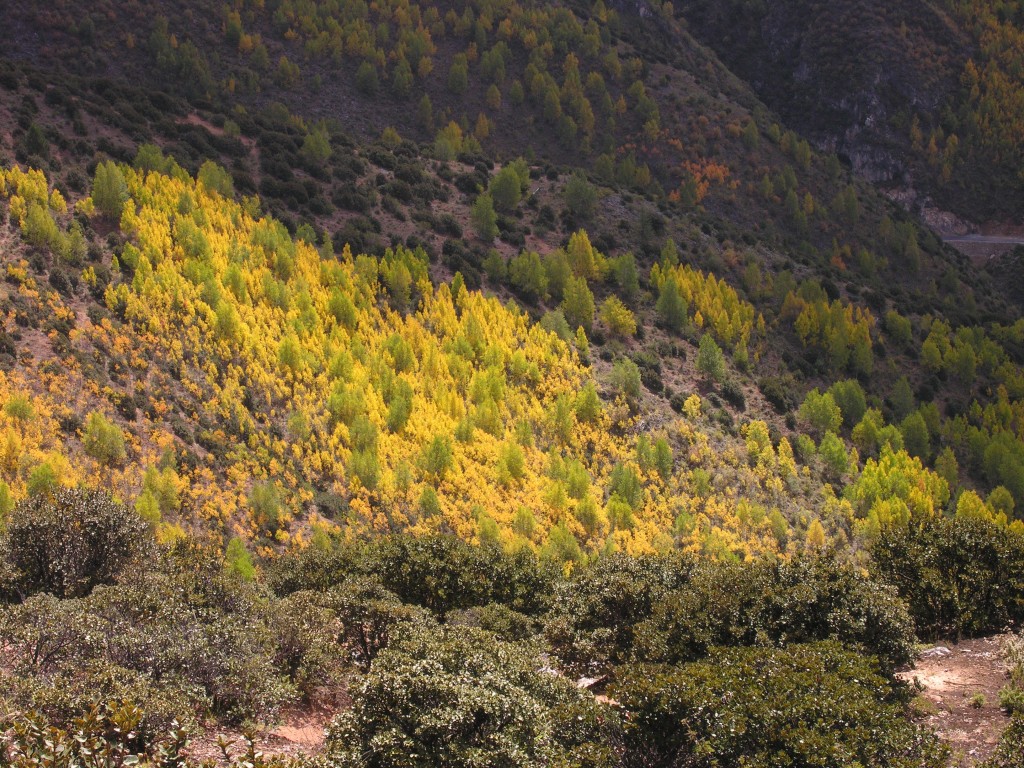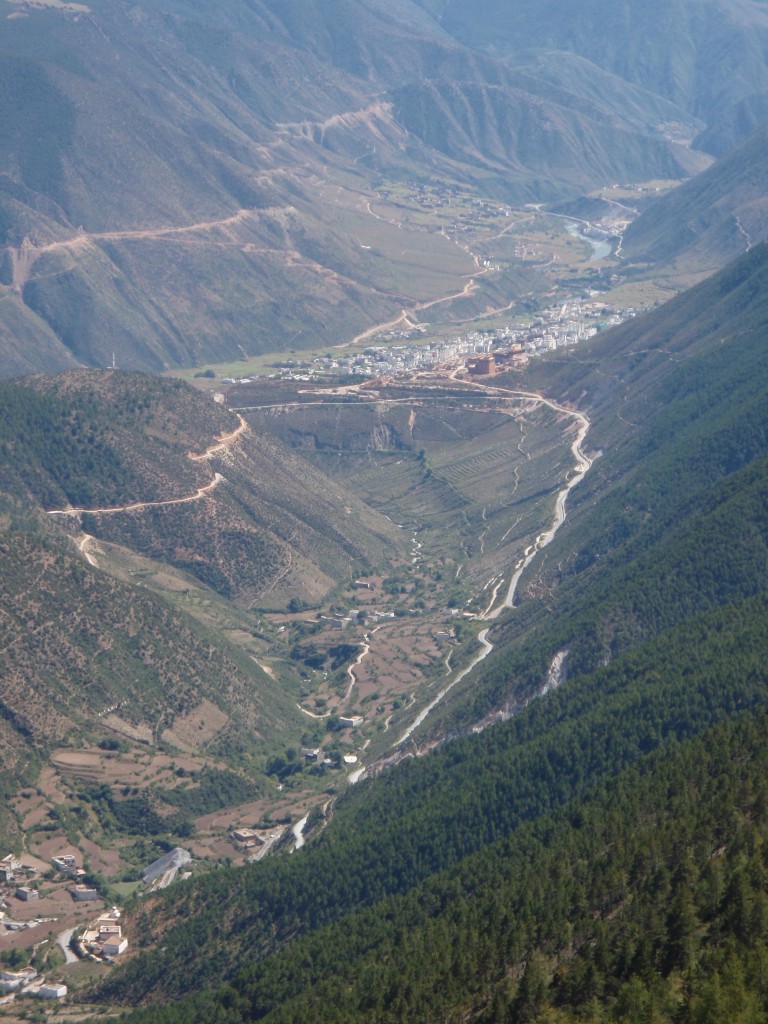We left Xiang Cheng, for another long day of climbing, our last over 4,000 meters. The road had a reasonable grade (we could maintain 7kph (about 4.5mph) and the surface was good bitumen. The views back down the valley to the monastery were spectacular and the few small farms blended organically into the vertical mountains.
At one curve in the road, a woman looked up from weeding her small orchard, and let out with an extended soliloquy on our presence, accompanied by a large smile. Her husband, walking in the road, waved us down, and eagerly suggested, in pantomime, the we join him for a rest under a shade tree. He too beamed with joy at the possibility of enjoying our company. We had a difficult (more than we knew) day ahead of us, and I pointed at my wrist and shook my head in denial. He persisted, and we went back and forth, all with smiles.
Finally we waved and pushed off, our 26 inch prayer wheels spinning out thousands of goodwill messages up his mountain; but I think we might have missed the point. The farmer and his wife live Shangri-la, not just in it, but they are Shangri-la. They are poor, but well fed, and the circle of their days allows for a break when tired, a visit with passing strangers, the rhythm of weeding, or wall building when they feel like it, and the song of bird and stream as accompaniment to it all.
We, on the other hand, have brought our schedule laden philosophy with us. We are here to SEE Shangri-la, not be it or live it. We have conquered her mountains, seen those living Shangri-la, but have not made the truth-based myth our own. Oh, we have absorbed much more than those black SUVs that pass us by the scores each day, carrying Chinese to possess for a holiday, their most exotic locations. At least we have the memory in our legs and lungs of the place; we have the images of the genuine smiles from the minorities directed to us as somehow kindred spirits. But will we bring it home with us?
Now for that thorn tree: As you will read in Claire’s note, there are many police in Shangri-la. As we have descended the Himalayas, the number of police posts on the roads has grown with one about every 50 kilometers. As we came up the eastern side of the range’s fingers, there were few posts, and they always waved us past, usually with a smile. Here it is different. We are still in Tibetan minority area, and very close to the border with the Tibetan Autonomous Region, where we assume they are expecting trouble. We were not able to go into the TAR as independent travelers, only as part of an organized group with a minder/guide. About a week ago, even that privilege was revoked for foreigners.
To me it seems at least a few of the police on this side have taken a negative tone with laowai (foreigners). Not all by any means, most perform your passport check professionally and even smile. But, after a beautiful descent of our last 4,000 meter peak, we came to a village where we understood there was accommodation. At the police stop, in the center of the village, one young man strutted back and forth of Zippy, regaling the growing crowd of mostly Tibetans with his apparently negative opinion of us. He particularly seemed to dislike the Tibetan prayer flag we had attached to the handlebar bag, and indicated his disgust with a sneer and a dismissive flip of the flag. He also told us the accommodation was no longer available, and through a translator, that we get a family to put us up, an unlikely possibility after word spread about his dislike of us. The locals fear the police. They don’t seem to be there to solve crimes, but to watch over the non-Han population, and make sure they have little contact with foreigners.
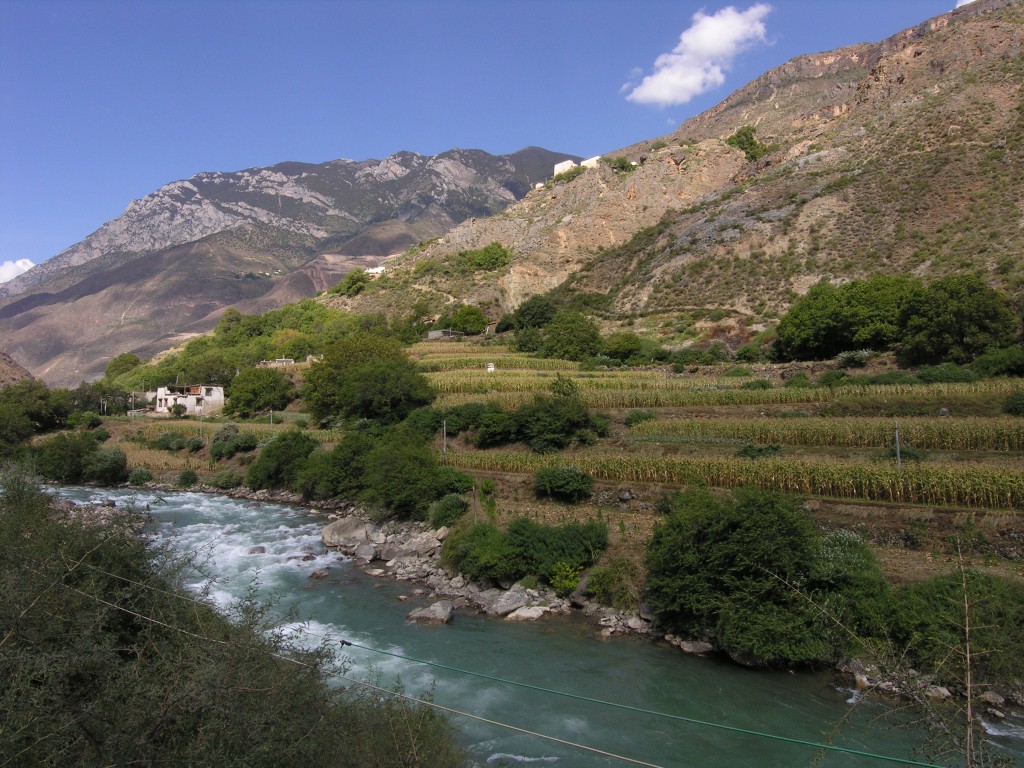
At this point we knew we would have to guerrilla camp, and bought two chicken legs at a store, and got some stir-fried egg and tomato, a huge bowl of rice, and all our water bottles filled with boiling water. While we were eating, an old Tibetan man fingering his beads, came over, touched our prayer flag, nodded his head and smiled. There is a split here and it revolved along religious/ethnic lines. Only one side wears uniforms. This could get us thrown out. Yesterday, I had to help a policeman go through all the pictures on the camera Claire uses to shoot from the back of Zippy. He was a pleasant young man, just doing his job, but to an American, it was difficult to endure. Few countries have a First Amendment. Treasure yours.
We left the village for a 12 kilometer climb to an uncertain camping spot. The mountain sides are so steep, below the Plateau, that we had to camp on a power line road, in full sight of the main road. We used a few limbs to break up the contour of the tent, made sure headlights wouldn’t hit us directly, and we don’t think we were seen. Claire had a couple of disturbing dreams, but we both slept well.
There were two more encounters with the police, including a mostly pleasant one here in Derong. We hope this eases us; even though we are getting accustomed to the delays, they are not the delays we would choose.
The (renamed) town of Shangri-la (here it is pronounced Shan Ge Li La) btw.
We watched the National Day festivities on television last night. The hyperactive, color coordinated crowds rallied for the cameras and the massive, meticulously staged production was visible only to Party members with box seats and everyone in television-land. Our celebration of the day consisted of us wishing the police well on China Day, three different times. The roadside checkpoints only grew tiresome because our day wore on longer as we waited for our passports to be returned.
One lone police man called us in to somewhere, browsed through the photos on one camera (he didn’t know about the other one), then after some tense effort to communicate, made it clear we were to check in at Derong, 40 kilometers down the road. At one checkpoint, the police seemed to laugh at us for interrupting their card game.
The festivities here in town consisted of ten minutes of fireworks a few meters in front of our hotel, but I think we were the only ones watching.
We’re enjoying the light traffic and rural roads of this steep mountain country, knowing that we’ll soon come back down to more densely populated areas. Here, the land is simply too vertical to support a large population and any relatively flat space is occupied or in use for growing food. The thin, clear air has been good for our lungs and the stiff climbs certainly good for our legs.

Claire Rogers writes on cross-cultural adventure drawn from her travels across the Silk Road from Beijing to Istanbul, around Australia and of course, through Iceland–all by bike.
She’s currently traveling by tandem with her husband Bob, through southwest China, Laos, Vietnam, Cambodia and Thailand. Check out NewBohemians.net for more information on their travels.


